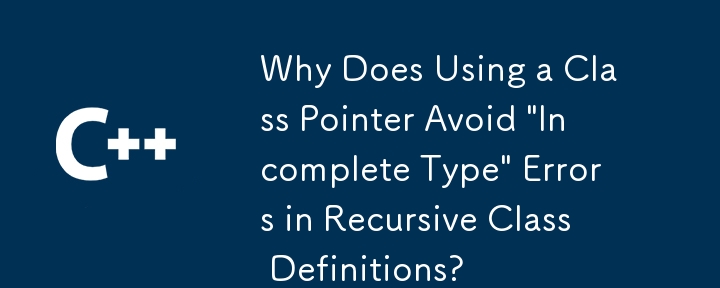

Recursion Impedes Class Definition
A recent programming query addressed the issue of declaring a private member within a class that mirrors the class's own type. Specifically, the following code raises an "incomplete type" error:
class A {
private:
A member;
}However, using a pointer instead of a direct member declaration ("A* member;") resolves the issue. Why is this the case?
The answer lies in the class definition process. When the member is declared within the class definition, the class itself is still being defined. This leaves the "A" type undefined, rendering it an "incomplete type." In contrast, when using a pointer, the compiler can recognize "A" as a class name even before its definition is complete, allowing it to define the "pointer to A" type.
This concept extends beyond classes. Declaring a type as "Foo;" effectively signals a class declaration without its full definition. However, "Foo* foo;" can be defined, as it represents a pointer to a "Foo" type, which the compiler acknowledges at that stage.
The same rationale applies when utilizing a recursive type definition that refers to itself. However, achieving this using only pointers offers a more straightforward approach. Consider the following alternative:
class A {
private:
boost::shared_ptr<A> member;
};By employing smart pointers (e.g., boost::shared_ptr), the need for manual memory management is eliminated.
The above is the detailed content of Why Does Using a Class Pointer Avoid \'Incomplete Type\' Errors in Recursive Class Definitions?. For more information, please follow other related articles on the PHP Chinese website!
 Introduction to service providers with cost-effective cloud server prices
Introduction to service providers with cost-effective cloud server prices
 File name contains illegal content
File name contains illegal content
 Apple mobile phone antivirus
Apple mobile phone antivirus
 Introduction to standard tags in php
Introduction to standard tags in php
 What are the drawing software?
What are the drawing software?
 WeChat Moments, two dashes and one dot
WeChat Moments, two dashes and one dot
 How to batch modify file names
How to batch modify file names
 How to set Chinese in eclipse
How to set Chinese in eclipse




